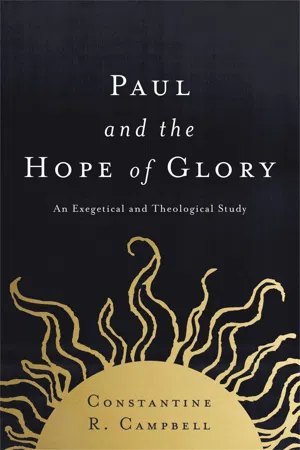
Paul and the Hope of Glory
An Exegetical and Theological Study
Constantine R. Campbell
- 480 pagine
- English
- ePUB (disponibile sull'app)
- Disponibile su iOS e Android
Paul and the Hope of Glory
An Exegetical and Theological Study
Constantine R. Campbell
Informazioni sul libro
A Unique Study of Pauline Eschatology that Is Both Exegetical and Theological
One of the trajectories coming out of Constantine Campbell's award-winning book Paul and Union with Christ is the significance of eschatology for the apostle. Along with union with Christ, eschatology is a feature of Paul's thinking that affects virtually everything else.
While union with Christ is the "webbing" that joins Paul's thought together, eschatology provides the "shape" of his thought, and thus gives shape to his teaching about justification, resurrection, the cross, ethics, and so forth. There is considerable debate, however, about Paul's eschatology, asking whether he is a "covenant" or an "apocalyptic" theologian.
In Paul and the Hope of Glory Campbell conducts a thorough exegetical study of the relevant elements of Paul's eschatological language, metaphors, and images including "parousia, " "the last day, " "inheritance, " "hope, " and others. He examines each passage in context, aiming to build inductively an overall sense of Paul's thinking. The results of this exegetical study then feed into a theological study that demonstrates the integration of Paul's eschatological thought into his overall theological framework.
The study is comprised of three parts:
- The first part introduces the key issues--both exegetical and theological--and sets the parameters and methodology of the book. It also offers an historical survey of the scholarly work produced on Paul's eschatology through the twentieth century to the present day.
- The second part contains the detailed exegetical analysis, with chapters on each important Pauline phrase, metaphor, and image related to eschatology.
- The third part turns its attention to theological synthesis. It recapitulates relevant conclusions from the evidence adduced in part two and launches into theological discussion engaging current issues and debates.
This volume combines high-level scholarship and a concern for practical application of a topic currently debated in the academy and the church. More than a monograph, this book is a helpful reference tool for students, scholars, and pastors to consult its treatment of any particular instance of any phrase or metaphor that relates to eschatology in Paul's thinking.
Domande frequenti
Informazioni
PART 1
INTRODUCTORY MATTERS

CHAPTER 1
INTRODUCTION AND METHODOLOGY
1.1 PAUL AND THE HOPE OF GLORY
1.2 WHAT DO WE MEAN BY “ESCHATOLOGY”?
The specific distinction of Paul’s eschatology can be recognized in how he interrelates firstly the past, with Christ’s death and resurrection, the proclamation of the Gospel, and the conversion of the believers; secondly, the present situation of the Christian communities; and thirdly, the future, with the aforementioned expectations as parts of one single eschatological narrative.”9
1.3 AN EXEGETICAL-THEOLOGICAL APPROACH
Indice dei contenuti
- Cover Page
- Title Page
- Copyright Page
- Dedication
- Detailed Table of Contents
- Acknowledgments
- Preface
- Abbreviations
- Part 1: Introductory Matters
- Part 2: Exegetical Study
- Part 3: Theological Study
- Bibliography
- Scripture Index
- Subject Index
- Author Index